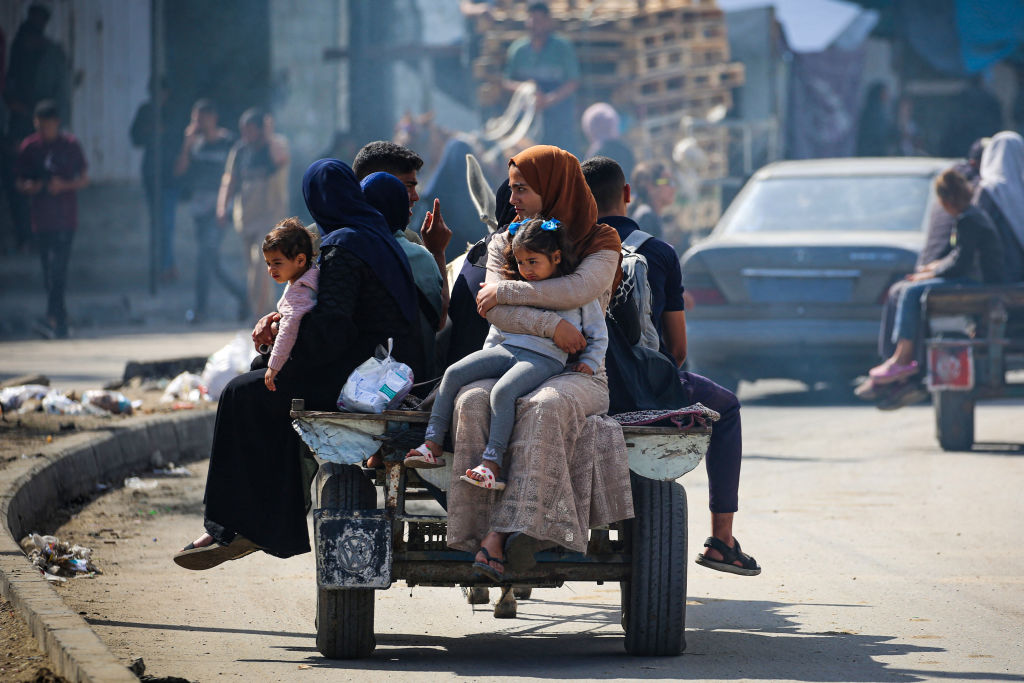

Biden Said Rafah Was a ‘Red Line.’ Now What?
When Israeli tanks rolled into Gaza’s southernmost city of Rafah this week, seizing control of its vital border crossing with neighboring Egypt, they appeared to be edging dangerously close to President Joe Biden’s red line. For months, the American president voiced his opposition to an Israeli invasion of the densely-populated city absent a clear and credible plan to safeguard the more than 1 million people sheltering there. But he never articulated exactly what price the Israeli government would pay if it went ahead with the offensive anyway, as it repeatedly said it would.
[time-brightcove not-tgx=”true”]
That is, until this week. On Wednesday, President Biden confirmed reports that Washington had paused a shipment of bombs to Israel amid concerns that the weapons could be used in Rafah—and threatened to withhold further arms supplies should a major ground invasion of the city go ahead. “I made it clear that if they go into Rafah—they haven’t gone into Rafah yet—I’m not supplying the weapons that have been used historically to deal with Rafah, to deal with the cities,” Biden told CNN, noting that this would not apply to defensive weapons, including ammunition for Israel’s Iron Dome. “We’re not going to supply the weapons and artillery shells.”
The move marks a major turning point for Biden, who until this point had refused to put any conditions on U.S. military aid amid ever-growing concerns over Israel’s conduct in Gaza, where nearly 35,000 have been killed. While the Biden administration has yet to make a public determination on whether it believes Israel has violated U.S. or international law in Gaza, Biden acknowledged in an apparent first that U.S. weapons have been used in the killing of civilians.
“The fact that he is now openly and explicitly threatening this consequence after months of no consequences, apart from perhaps the U.N. [ceasefire] resolution abstention, is a big deal,” Matt Duss, the executive vice president of the Center for International Policy and a former chief foreign policy advisor to Sen. Bernie Sanders, tells TIME. “It’s a departure from the president’s long-standing view of how the U.S-Israel relationship should work, and it’s also a sign I think of the absolutely dire situation in Rafah.”
While the Biden administration contends that Israel has yet to cross its red line on Rafah, noting that Israel’s seizure of the Rafah border crossing constituted “an operation of limited scale and duration,” those on the ground say that there is nothing limited about what is currently taking place in the city. On Monday, the Israeli military ordered the evacuation of some 100,000 people from nine area blocks on the southeastern part of the city, urging them to relocate to purported safe zones in the north, from which many were told to flee in the first place. That same day, Israel began conducting airstrikes on the city. By Tuesday morning, at least 23 people were killed, according to hospital records, among them at least six children.
“The media and analysts are understandably referring to this renewed offensive on Rafah as one that is limited, but I can’t say that that’s a word that resonates with people in Rafah,” says Suze van Meegen, the Norwegian Refugee Council’s head of operations in Palestine, who is currently based in Rafah. Between those fleeing the city in panic and fuel shortages that threaten to shut down the enclave’s remaining hospitals, bakeries, and water pumps, “it’s the most bleak picture I can imagine,” van Meegen says. “But the worst of it is the fear that we see.”
While Israeli officials were quick to condemn Biden’s decision, with the country’s far-right national security minister even going so far as to declare that “Hamas ❤️Biden,” Prime Minister Benjamin Netanyahu has remained conspicuously silent. He did, however, post a video to X on Thursday from a speech he made days earlier on Holocaust Remembrance Day, during which he stated that “if Israel is forced to stand alone, Israel will stand alone.” (Israel’s Prime Minister’s Office offered no further comment.)
The ball is now in Netanyahu’s court. But should the Israeli prime minister opt to call Biden’s bluff with a large-scale invasion, or choose to creep forward into Rafah more incrementally, the pressure will fall on Biden to back up his words with actions.
“This action by President Biden is welcome. We need to continue using our leverage in support of protecting innocent lives in Gaza,” Sen. Peter Welch, who has helped lead calls in Congress for the U.S. to consistently apply the Leahy Law to Israel, tells TIME.
“My hope is that this sends a clear message that the Netanyahu government hears.”
Get the latest work and career updates delivered straight to your inbox by subscribing to our magazine category today. Stay informed and ahead of the game with Subscrb.
The content on this website has been curated from various sources and is for informational purposes only. We do not claim ownership of any of the content posted here, all rights belong to their respective authors. While we make every effort to ensure that the information is accurate and up-to-date, we cannot guarantee its completeness or accuracy. Any opinions or views expressed on this website are solely those of the original authors and do not necessarily represent our own. We do not endorse or take responsibility for the content or actions of external websites or individuals linked from this website. Any reliance on the information provided on this website is done at your own risk. Please note that this article was originally seen on the source website TIME, by the author Yasmeen Serhan
-
SALE!




Forbes Asia Magazine Subscription
From: RM220 / year -
SALE!


Fortune Magazine Subscription
From: RM118 / year -
OUT OF STOCK




The Economist Magazine Subscription
From: RM1530 / year -


Inc. Magazine Magazine Subscription
From: RM22 / year -


Consumer Reports Magazine Subscription
From: RM22 / year -


Harvard Business Review Magazine Subscription
From: RM83 / month -


Entrepreneur’s Startups Magazine Subscription
From: RM4 / year -


BILLIONAIRE Magazine Subscription
From: RM131 / year



